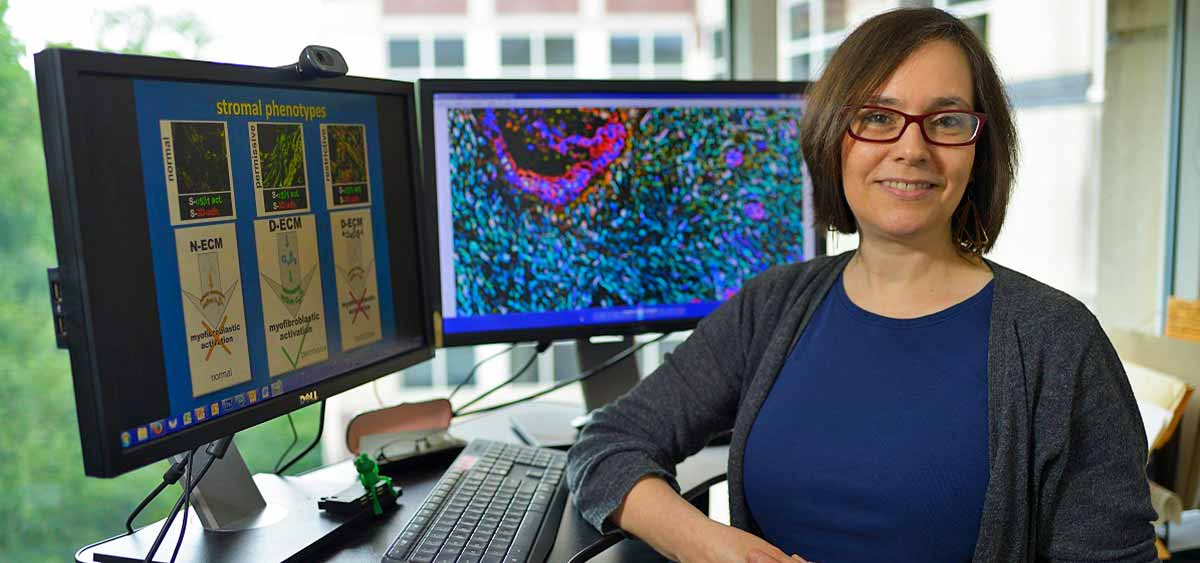
PHILADELPHIA (January 27, 2020) – A researcher at Fox Chase Cancer Center has received a $292,999 grant from the prestigious charity Worldwide Cancer Research for a two-year study of the microenvironment of pancreatic cancer cells. The tumor microenvironment consists of various cells surrounding cancer cells that determine how tumors grow and gives clues as to how they may be attacked with therapies.
Edna Cukierman, PhD, associate professor in the Cancer Biology Research Program and coleader of the Marvin and Concetta Greenberg Pancreatic Cancer Institute, will investigate the role of cancer-associated fibroblasts (CAFs) in neoneurogenesis, as well as the abnormal presence of central nervous system proteins in the pancreatic cancer microcellular environment.
“Our study looks at the microenvironment, the cells at the immediate vicinity of the cancer cells, to understand tumor progression,” said Cukierman. Her hypothesis is that “non-cancer cells, like CAFs, in the cellular neighborhood are bridging communicators between nerves and cancer cells. Thus, CAFs are key enablers of nerve-facilitated tumor progression, kind of like the orchestra director.”
Treating pancreatic cancer presents unique challenges due to the modifications of the cellular microenvironment that causes an overabundance of fibrous tissue as well as a dramatic increase in new nerve development in the pancreas, which is associated with pain, metastasis, and poor patient prognosis.
Additionally, patients who have undergone removal of their pancreas do not always fully recover and Cukierman believes the abundant neoneurogenesis is a key component to understanding why the cancer cells are able to persist and repopulate healthy tissue following surgery.
“Others have observed that pancreas cancer cells are able to hide within the nerves and that these are recalled during the healing process.” Cukierman believes that local CAFs and CAF-generated extracellular matrices play a pivotal role in allowing the return of the pancreatic cancer cells, hiding in the nerves, following surgery.
When comparing pancreatic patient-harvested CAFs with unaffected neighboring pancreatic fibroblastic cells, Cukierman’s team noticed a protein normally found in brain synapses was allowing CAFs to mimic some nerve functions. She theorizes that the fibroblasts are using this synapse-like form of communication to both connect with nerves and enable the survival of cancer cells.
Previous trials have attempted to entirely eliminate CAFs, often resulting in making the cancer more aggressive. As part of her novel approach, Cukierman hopes that by targeting only the synapse-associated protein (or proteins), the pancreatic-cancer educated fibroblasts such as CAFs will cease enabling pancreatic cancer progression and regain their natural tumor-suppressive function.
Her team will now focus on normalizing the cellular microenvironment and “persuade the neighborhood cells to behave as good/productive citizens again.” Cukierman hopes her research will lead to a distinct therapy that will have limited secondary effects and improve the prognosis of pancreatic cancer patients.
Helen Rippon, PhD, chief executive of Worldwide Cancer Research, said: “We are delighted to be funding such a novel and exciting piece of research that could one day have a major impact on the lives of people with cancer. This project highlights exactly what we strive to do at Worldwide Cancer Research – to find and fund bold new ideas in cancer research no matter where in the world they are taking place.”